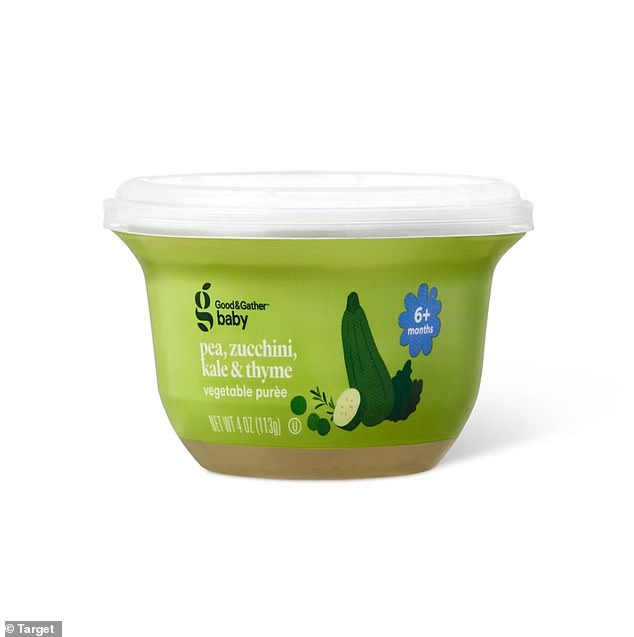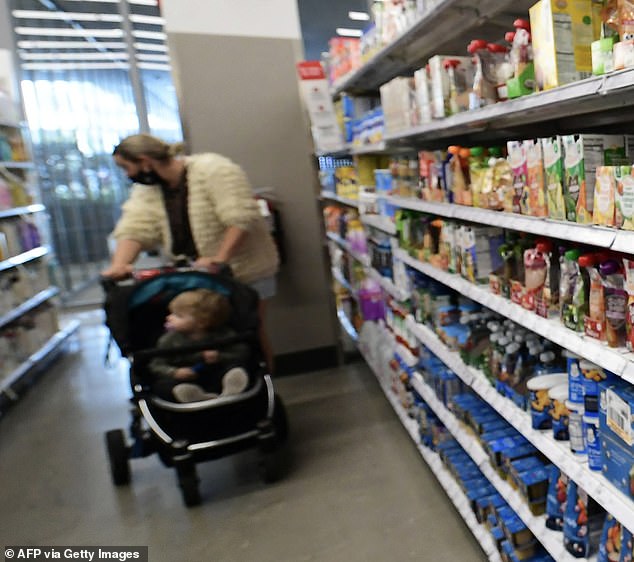Over 25,000 containers of baby food exclusively sold at Target nationwide have been recalled over a lead contamination.
The recall affects four-ounce containers of Good & Gather Baby Pea, Zucchini, Kale & Thyme Vegetable Purée, Target’s store brand baby food purée.
While the brand has other flavors, this one is the only one being pulled from shelves due to lead.
In total, 25,600 containers of Baby Pea, Zucchini, Kale & Thyme Vegetable Purée are being recalled, and Target revealed that this product was sold nationwide.
The recalled containers come from two batches of the baby food: Lot Number 4169 that has a Best by date of December 9, 2025, and Lot Number 4167, which has a Best by December 7, 2025.
The US Food and Drug Administration (FDA) initially alerted shoppers to the elevated levels of lead in March.
However, the alert has now been upgraded, receiving a Class II recall warning, meaning that eating this baby food could cause temporary medical problems involving the brain and other organs.
This is just one step down from a Class I recall, which means a product could cause severe health issues and even death.

The baby food recall specifically affects 4oz. containers of Good & Gather Baby Pea, Zucchini, Kale & Thyme Vegetable Purée sold at Target
Although the recall still hasn’t been included on Target’s official recall list, elevated lead levels in baby food could pose serious health risks to infants and young children, including causing damage to the brain, blood, and other organs.
Lead is a toxic heavy metal that can accumulate in the body. Young children are particularly at risk because their developing bodies tend to absorb higher rates of the toxin.
If a baby were to consume too much lead, the poisoning could lead to neurological damage, impairing brain development, lowering IQs, and potentially causing learning disabilities, behavioral issues, and developmental delays.
Studies have warned that even low levels of exposure to lead may cause irreversible harm.
Dr Sana Mujahid, Consumer Reports’ manager of food safety research and testing, said: ‘We know that there is no safe level of lead exposure for babies and small children, who are particularly vulnerable to negative health consequences due to their smaller size and developing organ systems.’
Target has released a statement about the recall, noting that they require suppliers like Good & Gather to uphold all safety standards at the local, state, and federal levels.
As of January 2025, the FDA required all baby food containing fruits, vegetables, mixtures of grains and meat, yogurts, custards and puddings, and single-ingredient meats to have lead levels lower than 10 parts per billion (ppb).
Ppb is a way of measuring tiny amounts of something in a larger substance, like lead in baby food.

Food contaminated with unsafe levels of lead can cause neurological damage, impair brain development, and lower IQ scores among children

Customers who have purchased the recalled baby food are urged to throw it away. They can also contact the Target store they purchased it from for a full refund
Imagine a billion droplets of water in a huge swimming pool. If you add one drop of lead to that pool, that’s one part per billion.
So, 10 ppb means 10 drops of lead in that billion-droplet pool. It may sound very tiny, but when it comes to lead, it’s still concerning for babies.
For baby foods containing single-ingredient root vegetables like carrots and sweet potatoes and dry infant cereals, that limit is 20 ppb.
Anyone that has purchased the recalled baby food is urged to throw it away. Customers with the contaminated purée can also take it back to the store or contact Target’s Guest Relations at 800-440-0680 for a full refund.
For parents who believe their child may have eaten some of the recalled Good & Gather purée, Dr Mujahid recommended that they speak with their pediatrician who would likely have more information about lead tests children can undergo.
A blood test is the most reliable check parents can do, which will reveal the level of lead in the infant’s system.
This is usually done through a finger prick (capillary test) or by having blood drawn from the veins. Venous tests tend to be more accurate for confirming unsafe lead levels.
Although the CDC maintains that no levels of lead in the blood is safe, federal officials use a blood lead reference value (BLRV) of 3.5 micrograms per deciliter (µg/dL) as their threshold when determining if a child has elevated lead levels in their body.
A microgram (µg) is equal to one-millionth of a gram. Meanwhile, a deciliter (dL) is about half a cup of liquid (100 milliliters), roughly the same amount of blood taken in a small syringe during medical tests.
The National Health and Nutrition Examination Survey (NHANES) has found that most children in the US have lead levels below 1 µg/dL.
NHANES data collected between 2011 and 2016 specifically found that blood-lead levels for kids under the age of five was approximately 0.83 µg/dL.
The most common ways children encounter lead is through old paint that is chipping off of walls and contaminated water systems.
However, lead can also be found in children’s clothing, stainless steel bottles and sippy cups, desks, toys, and jewelry.
As for food and other goods, the CDC noted last month that foods, cosmetics, ceremonial powders, and traditional remedies being imported from unregulated sources could act as untested carriers of lead.
The agency recently found dangerous lead levels in certain spices imported from sources in Vietnam, India, and Syria.









